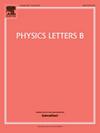Time evolution and thermal renormalization group flow in cosmology
IF 4.3
2区 物理与天体物理
Q1 ASTRONOMY & ASTROPHYSICS
引用次数: 0
Abstract
Time-evolution of the Universe as described by the Friedmann equation can be coupled to equations of motion of matter fields. Quantum effects may be incorporated to improve these classical equations of motion by the renormalization group (RG) running of their couplings. Since temporal and thermal evolutions are linked to each other, astrophysical and cosmological treatments based on zero-temperature RG methods require the extension to finite-temperatures. We propose and explore a modification of the usual finite-temperature RG approach by relating the temperature parameter to the running RG scale as (in natural units), where is acting as a running cutoff for thermal fluctuations and the momentum k can be used for the quantum fluctuations. In this approach, the temperature of the expanding universe is related to the dimensionless quantity τ (and not to ). We show that by this choice dimensionless RG flow equations have no explicit k-dependence, as it is convenient. We also discuss how this modified thermal RG is used to handle high-energy divergences of the RG running of the cosmological constant and to “solve the triviality” of the model by a thermal phase transition in terms of τ in Euclidean dimensions.
宇宙学中的时间演化和热重正化群流
弗里德曼方程所描述的宇宙时间演化可以与物质场的运动方程耦合。量子效应可以通过对它们的耦合进行重正化群(RG)来改进这些经典运动方程。由于时间演化和热演化相互关联,基于零温 RG 方法的天体物理学和宇宙学处理需要扩展到有限温度。我们提出并探索了对通常的有限温度 RG 方法的修改,将温度参数与运行 RG 尺度关系为 T≡kT=τk(自然单位),其中 kT 作为热波动的运行截止值,而动量 k 可用于量子波动。在这种方法中,膨胀宇宙的温度与无量纲量 τ 相关(而不是与 kT 相关)。我们证明,通过这种选择,无量纲 RG 流方程没有明确的 k 依赖性,因为这很方便。我们还讨论了如何利用这种修正的热 RG 来处理宇宙常数 RG 运行的高能发散,以及如何在 d=4 欧几里得维度上通过 τ 的热相变来 "解决 "j4 模型的 "琐碎性"。
本文章由计算机程序翻译,如有差异,请以英文原文为准。
求助全文
约1分钟内获得全文
求助全文
来源期刊

Physics Letters B
物理-物理:综合
CiteScore
9.10
自引率
6.80%
发文量
647
审稿时长
3 months
期刊介绍:
Physics Letters B ensures the rapid publication of important new results in particle physics, nuclear physics and cosmology. Specialized editors are responsible for contributions in experimental nuclear physics, theoretical nuclear physics, experimental high-energy physics, theoretical high-energy physics, and astrophysics.
 求助内容:
求助内容: 应助结果提醒方式:
应助结果提醒方式:


